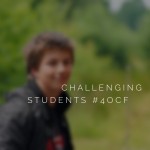Our first dusting of snow finally hit the East Coast this past weekend. On the coldest yet of winter days, there is more snow in the forecast for this weekend. Just a month ago, it seemed as if we wouldn’t get any snow all winter. Sixty and even seventy degrees became the norm in December.
All of these extremes in temperature and weather have me wondering about expert opinions on global warming. Scientists point to a two degree change in ocean temperature having a major impact on our planet. While two degrees doesn’t seem like that significant of a shift, when that change is magnified across the earth’s oceans, the global ramifications are evident.
While delving into this possibility, I also wonder about how this applies to our educational system.
Could a two degree change in our educational practices also have the same far reaching impact, only in a more positive way? The simple answer is yes. There are small steps that educators can take to improve their impact upon students and learning.
Consider these slight changes in order to improve teaching and learning.
Change your mindset. A minor shift in how you think about certain things in the classroom can help to clarify your teaching and student learning. For example, examine the “stuff” that students do on a daily basis. Write a list of everything that happens during the week. At the end of the week, consider which activities are not meaningful or relevant to you or your students. Simply eliminate the “stuff” that is just taking up precious time in order to have students do more meaningful activities.
Choose your words carefully. The simple introduction of the word yet can have a very powerful impact for learners. When a student says, “I’m not good at multiplication,” encourage the student to add the word yet. This word leaves room for improvement, and opens up the possibility that the student will still work to improve in that area. When a student says, “I’m not good at multiplication yet,” that student is working toward improvement and making forward progress.
Ponder your destination. Always consider your end goal for students. While much of the learning that takes place in our classrooms happens throughout the process of learning, never lose sight of where you are trying to take students. A simple goal should be the driving force behind your teaching. Determining that students will leave your classroom as better writers engaged with authentic audiences provides a clear context for your writing instruction throughout the year.
Use mistakes to propel learning. Allow students the opportunity to make mistakes in your classroom, but ask them to use these mistakes to improve their knowledge base. One of my favorite activities to use with my students was having them create the four multiple choice answers to a math problem. This activity forced students to consider the mistakes that a student might make in solving a problem. For example, one of the most common mistakes that elementary students make is not checking to see which operation they should be using. When students looked for and acknowledged these type of mistakes, they were much less likely to make the same mistakes when solving problems.
Celebrate success. When you are caught up in the daily grind of a 180 day school year, you sometimes miss the progress that is happening every day. Take time each day to celebrate the small successes that are happening in your classroom. It could be the small a-ha moments for a student. It could be a student reading the story they just finished. Remember to acknowledge those students who are making progress each and every day, even when it doesn’t sometimes feel that way.
Remember that momentous changes that have occurred in our history have started with the slightest movement. Shifting your instruction or student learning just two degrees may be the spark that ignites a momentous change in your classroom or school. It may lead to a district-wide movement to improve teaching and learning.
Start your change. Two degrees. That’s all it takes.
Rich




